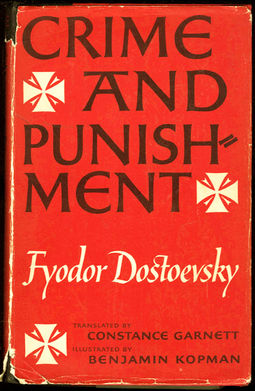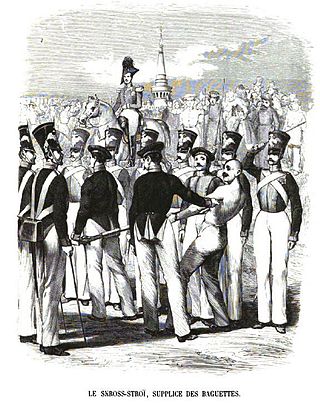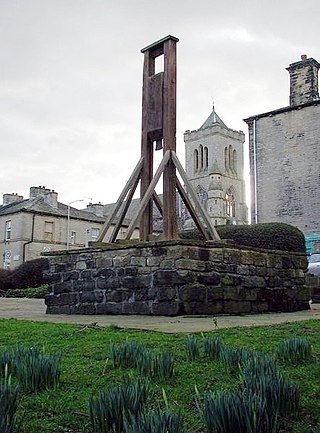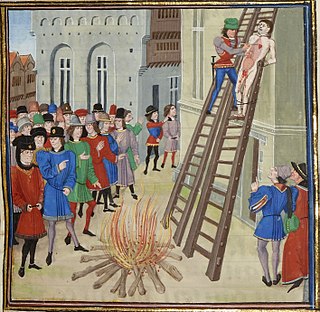
A corporal punishment or a physical punishment is a punishment which is intended to cause physical pain to a person. When it is inflicted on minors, especially in home and school settings, its methods may include spanking or paddling. When it is inflicted on adults, it may be inflicted on prisoners and slaves.

In Greek mythology, Tartarus is the deep abyss that is used as a dungeon of torment and suffering for the wicked and as the prison for the Titans. Tartarus is the place where, according to Plato's Gorgias, souls are judged after death and where the wicked received divine punishment. In Hesiod's Theogony, Tartarus is described as one of the earliest beings to exist, alongside Chaos, Gaia (Earth) and Eros (Love).
Lucifer is the name of two unrelated fictional characters appearing in American comic books published by Marvel Comics. One is an alien supervillain of the X-Men and the other is a villain of Ghost Rider and is referred to as the Prince of Darkness.

Crime and Punishment is a novel by the Russian author Fyodor Dostoevsky. It was first published in the literary journal The Russian Messenger in twelve monthly installments during 1866. It was later published in a single volume. It is the second of Dostoevsky's full-length novels following his return from ten years of exile in Siberia. Crime and Punishment is considered the first great novel of his mature period of writing and is often cited as one of the greatest works of world literature.

The breaking wheel, also known as the execution wheel, the Wheel of Catherine or the (Saint) Catherine('s) Wheel, was a torture method used for public execution primarily in Europe from antiquity through the Middle Ages up to the 19th century by breaking the bones of a criminal or bludgeoning them to death. The practice was abolished in Bavaria in 1813 and in the Electorate of Hesse in 1836: the last known execution by the "Wheel" took place in Prussia in 1841. In the Holy Roman Empire it was a "mirror punishment" for highwaymen and street thieves, and was set out in the Sachsenspiegel for murder, and arson that resulted in fatalities.

Flagellation, flogging or whipping is the act of beating the human body with special implements such as whips, rods, switches, the cat o' nine tails, the sjambok, the knout, etc. Typically, flogging has been imposed on an unwilling subject as a punishment; however, it can also be submitted to willingly and even done by oneself in sadomasochistic or religious contexts.

In the Hebrew Bible, the name Azazel represents a desolate place where a scapegoat bearing the sins of the Jews was sent during Yom Kippur. During the late Second Temple period, Azazel came to be viewed as a fallen angel responsible for introducing humans to forbidden knowledge, as described in the Book of Enoch. His role as a fallen angel partly remains in Christian and Islamic traditions.

The pillory is a device made of a wooden or metal framework erected on a post, with holes for securing the head and hands, formerly used for punishment by public humiliation and often further physical abuse. The pillory is related to the stocks.

Birching is a form of corporal punishment with a birch rod, typically applied to the recipient's bare buttocks, although occasionally to the back and/or shoulders.
Scaphism, also known as the boats, is an alleged ancient Persian method of execution mentioned by Plutarch in his Life of Artaxerxes. It ostensibly entailed trapping the victim between two boats, feeding and covering them with milk and honey, and allowing them to fester and be devoured by insects and other vermin over time.

The cat o' nine tails, commonly shortened to the cat, is a type of multi-tailed whip or flail. It originated as an implement for physical punishment, notably in the Royal Navy and British Army, and as a judicial punishment in Britain and some other countries.

To run the gauntlet means to take part in a form of corporal punishment in which the party judged guilty is forced to run between two rows of soldiers, who strike out and attack them with sticks or other weapons.
The men's 800 metres was the middle of the seven men's track races in the Athletics at the 1964 Summer Olympics program in Tokyo. 47 athletes from 32 nations competed. The maximum number of athletes per nation had been set at 3 since the 1930 Olympic Congress. The first round was held on 14 October, with the semifinals on 15 October and the final on 16 October. The event was won by Peter Snell of New Zealand, successfully defending his 1960 gold medal, and completing the first half of his 800 metres/1500 metres double. Bill Crothers of Canada took silver, the first 800 metres medal for that nation since 1936 and matching Canada's best-ever result in the event. Wilson Kiprugut's bronze was the first medal by Kenya in any event; Kenya would become a frequent fixture on the men's 800 metres podium.

Mazares was a Median general who defected to Cyrus the Great when the latter overthrew his grandfather, Astyages and formed the Persian Empire. Mazares is mentioned by Herodotus as a Median general in the service of Cyrus the Great who died while putting down a revolt in Asia Minor.

The Halifax Gibbet was an early guillotine used in the town of Halifax, West Yorkshire, England. Estimated to have been installed during the 16th century, it was used as an alternative to beheading by axe or sword. Halifax was once part of the Manor of Wakefield, where ancient custom and law gave the Lord of the Manor the authority to execute summarily by decapitation any thief caught with stolen goods to the value of 131⁄2d or more, or who confessed to having stolen goods of at least that value. Decapitation was a fairly common method of execution in England, but Halifax was unusual in two respects: it employed a guillotine-like machine that appears to have been unique in the country, and it continued to decapitate petty criminals until the mid-17th century.

Capital punishment is a legal penalty in Russia, but is not used due to a moratorium and no death sentences or executions have occurred since 2 August 1996. Russia has a moratorium implicitly established by President Boris Yeltsin in 1996, and explicitly established by the Constitutional Court of Russia in 1999 and reaffirmed in 2009.
Dives and Lazarus is traditional English folk song listed as Child ballad 56 and number 477 in the Roud Folk Song Index. It is considered a Christmas carol and based on the parable of the rich man and Lazarus. The song traditionally used a variety of tunes, but one particular tune, published by Lucy Broadwood in 1893 and used in other traditional songs, inspired many notable works and appeared in several pieces composed by Ralph Vaughan Williams.

To be hanged, drawn and quartered became a statutory penalty for men convicted of high treason in the Kingdom of England from 1352 under King Edward III (1327–1377), although similar rituals are recorded during the reign of King Henry III (1216–1272). The convicted traitor was fastened to a hurdle, or wooden panel, and drawn by horse to the place of execution, where he was then hanged, emasculated, disembowelled, beheaded, and quartered. His remains would then often be displayed in prominent places across the country, such as London Bridge, to serve as a warning of the fate of traitors. For reasons of public decency, women convicted of high treason were instead burned at the stake.

Judicial corporal punishment is the infliction of corporal punishment as a result of a sentence imposed on an offender by a court of law. The punishments include caning, bastinado, birching, whipping, or strapping. The practice was once commonplace in many countries, but over time it has been abolished in most countries, although still remaining a form of legal punishment in some countries including a number of former British colonies and Muslim-majority states.
"Weatherman" is a science fiction short story by American writer Lois McMaster Bujold, first published in the February 1990 issue of Analog Science Fiction and Fact. It was later included in The Space Opera Renaissance collection. Written as a prelude story starring a character used by Bujold in the Vorkosigan Saga, it was republished as the first six chapters of The Vor Game. "Weatherman" was nominated for the Nebula Award for Best Novella, while The Vor Game won the Hugo Award for Best Novel.












